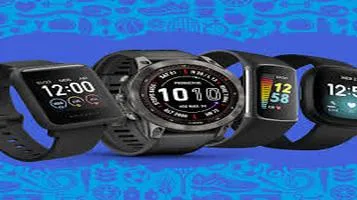The Best Fitness Trackers for Athletes: An In-Depth Review
The best fitness trackers for athletes are designed to offer comprehensive insights into performance, recovery, and overall health. These devices often feature advanced metrics such as VO2 max, heart rate variability, and GPS tracking to monitor speed and distance accurately. Top models like the Garmin Forerunner series and the Apple Watch Ultra cater to serious athletes with robust features including customizable workout modes, long battery life, and water resistance. They also provide integration with various fitness apps for personalized training plans and progress tracking. With real-time feedback and detailed analytics, these trackers help athletes optimize their training, prevent injury, and achieve their performance goals, making them essential tools for both amateur and professional sports enthusiasts.

In today's high-tech world, athletes of all levels rely on fitness trackers to monitor their performance, optimize their training, and achieve peak physical condition. With a myriad of options available, it can be challenging to select the right device that meets the specific needs of athletes. This review delves into some of the best fitness trackers available, evaluating their features, accuracy, and overall value.
1. Garmin Forerunner 945
Pros:
- Advanced performance metrics
- Comprehensive mapping and GPS capabilities
- Long battery life
Cons:
- Expensive
- Complex interface for beginners
Garmin has long been a favorite among athletes, and the Forerunner 945 is a testament to the brand's commitment to excellence. This high-end fitness tracker offers advanced performance metrics such as VO2 max, training load, and recovery time, making it ideal for serious athletes. One of its standout features is its comprehensive mapping and GPS capabilities, which provide accurate route tracking and navigation, essential for long-distance runners and cyclists.
The battery life is impressive, lasting up to two weeks in smartwatch mode and up to 36 hours in GPS mode. However, the Forerunner 945 comes with a steep price tag and a complex interface that might be overwhelming for beginners. Nevertheless, for those committed to their athletic goals, this tracker is worth the investment.
2. Apple Watch Series 8
Pros:
- Seamless integration with iOS devices
- Comprehensive health tracking features
- Stylish design
Cons:
- Shorter battery life compared to competitors
- Higher price point
The Apple Watch Series 8 continues to be a top choice for athletes who are also entrenched in the Apple ecosystem. It offers seamless integration with iOS devices, making it convenient for users to sync their data effortlessly. This smartwatch goes beyond basic fitness tracking by providing comprehensive health metrics, including ECG, blood oxygen levels, and sleep tracking.
While its design is undoubtedly stylish, the Apple Watch Series 8 falls short in terms of battery life, lasting only about 18 hours on a single charge. This can be a drawback for athletes engaged in extended training sessions or multi-day events. However, its array of features and the convenience of Apple integration make it a strong contender in the fitness tracking market.
3. Fitbit Charge 5
Pros:
- Affordable price
- Advanced health metrics
- Comfortable and lightweight design
Cons:
- Limited GPS functionality
- Smaller display
Fitbit has carved out a niche for itself by providing reliable and affordable fitness trackers, and the Charge 5 exemplifies this reputation. Priced more affordably than many high-end models, this tracker offers advanced health metrics, including heart rate variability, SpO2 monitoring, and stress management tools.
The Charge 5 is comfortable and lightweight, making it suitable for all-day wear. However, it falls short in terms of GPS functionality, requiring users to connect to their smartphones for detailed route tracking. The smaller display might also be a drawback for some users, but its affordability and robust health features make it an excellent choice for budget-conscious athletes.
4. Polar Vantage V2
Pros:
- Precision heart rate monitoring
- Extensive training programs
- Durable and lightweight
Cons:
- Higher price
- Limited app ecosystem
Polar has a long history of producing high-quality fitness equipment, and the Vantage V2 is no exception. This tracker excels in precision heart rate monitoring, utilizing Polar’s proprietary technology to provide accurate data even during intense workouts. It also offers extensive training programs tailored to various sports, making it a versatile tool for athletes.
The Vantage V2 is both durable and lightweight, designed to withstand rigorous training conditions. However, it comes with a higher price tag and a more limited app ecosystem compared to Garmin and Apple. Despite these drawbacks, its precise monitoring capabilities and tailored training programs make it a valuable asset for dedicated athletes.
5. Whoop Strap 4.0
Pros:
- Focus on recovery and strain
- Continuous monitoring
- Comfortable for 24/7 wear
Cons:
- Subscription-based model
- No display
The Whoop Strap 4.0 takes a unique approach by focusing on recovery, strain, and sleep, rather than just activity tracking. This tracker excels in providing insights into how well athletes recover from workouts, offering recommendations on optimal training loads based on continuous monitoring of heart rate variability, sleep quality, and other metrics.
Its design is comfortable for 24/7 wear, but it lacks a display, meaning all data must be accessed through the accompanying app. Additionally, Whoop operates on a subscription-based model, which can be a deterrent for some users. However, for athletes serious about optimizing their recovery and training, the Whoop Strap 4.0 offers unparalleled insights.
Conclusion
Selecting the right fitness tracker ultimately depends on an athlete's specific needs and preferences. The Garmin Forerunner 945 and Polar Vantage V2 are excellent choices for those seeking advanced performance metrics and training programs. The Apple Watch Series 8 offers comprehensive health tracking with seamless iOS integration, while the Fitbit Charge 5 provides robust features at an affordable price. Lastly, the Whoop Strap 4.0 stands out for its focus on recovery and continuous monitoring.
Each of these trackers brings unique strengths to the table, ensuring that athletes can find a device that aligns with their goals and enhances their training regimen.





